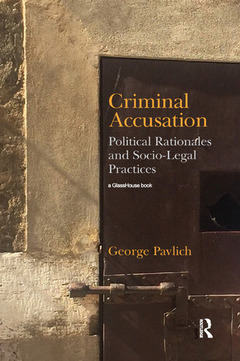Criminal Accusation Political Rationales and Socio-Legal Practices
Auteur : Pavlich George

Accusing someone of committing a crime arrests everyday social relations and unfurls processes that decide on who to admit to criminal justice networks. Accusation demarcates specific subjects as the criminally accused, who then face courtroom trials, and possible punishment. It inaugurates a crime?s historical journey into being with sanctioned accusers successfully making criminal allegations against accused persons in the presence of authorized juridical agents. Given this decisive role in the production of criminal identities, it is surprising that criminal accusation has received relatively short shrift in sociological, socio-legal and criminological discourses. In this book, George Pavlich redresses this oversight by framing a socio-legal field directed to political rationales and practices of criminal accusation. The focus of its interrogation is the truth-telling powers of an accusatory lore that creates subjects within the confines of socially authorized spaces. And, in this respect, the book has two overarching aims in mind. First, it names and analyses powers of criminal accusation ? its history, rationales, rites and effects ? as an enduring gateway to criminal justice. Second, the book evaluates the prospects for limiting and/or changing apparatuses of criminal accusation. By understanding their powers, might it be possible to decrease the number who enter criminal justice?s gates? This question opens debate on the subject of the book?s final section: the prospects for more inclusive accusative grammars that do not, as a reflex, turn to exclusionary visions of crime and vengeful, segregated, corrective or risk-orientated punishment. Highlighting how expansive criminal justice systems are populated by accusatorial powers, and how it might be possible to recalibrate the lore that feeds them, this ground-breaking analysis will be of considerable interest to scholars working in socio-legal research studies, critical criminology, social theory, postcolonial studies and critical legal theory.
Preface
Acknowledgements
Introduction
1 Accusation: Landscapes of Exclusion
2Apparatuses of Criminal Accusation
3 Avowal and Criminal Accusation
4The Violent Rhetoric of Accusation: Cicero and the Marcus Ameleus Scaurus Case
5Cultural Grammars of Accusation: Thomas of Monmouth’s Blood Libel Accusations
6Creating Crime: Accusatory Entryways to Criminal Justice
7 The Lore of Criminal Accusation
8Criminal Justice and Cape Law’s Persons
9Forget Crime: Accusation, Governance and Criminology
10The Emergence of Habitual Criminals in Nineteenth-Century Britain: Implications for Criminology
11The Subjects of Criminal Identification
Afterword
Index
George Pavlich is a Canada Research Chair in Social Theory, Culture and Law, and Professor of Law and Sociology at the University of Alberta, Canada.
Date de parution : 01-2019
15.6x23.4 cm
Disponible chez l'éditeur (délai d'approvisionnement : 14 jours).
Prix indicatif 53,83 €
Ajouter au panierDate de parution : 12-2017
15.6x23.4 cm
Disponible chez l'éditeur (délai d'approvisionnement : 14 jours).
Prix indicatif 160,25 €
Ajouter au panierThèmes de Criminal Accusation :
Mots-clés :
Young Man; DNA Identification; Capital Punishment; Criminal Accusations; DNA Profile; Galton’s Composite Portraits; Age Prisoner; Criminal Justice Arenas; Habitual Criminals; Blood Libel Accusation; Pope Innocent III; Criminal Identification; Grand Jury Presentments; Biopolitical Apparatuses; King Archon; Dominion Law; John Sunday; Galton’s Science; Cultural Grammar; Accusatorial Process; Criminal Justice Networks; Lowly Beginnings; Higher Evidential Standards; Thomas’s Text; Criminal Class



